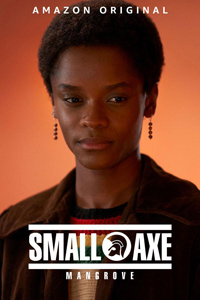All for Notting Hill: McQueen Paints the Power of Resistance in Period Courtroom Drama
 The first of five installments from Steve McQueen’s “Small Axe” anthology, Mangrove abandons the intimate musical revelries of Lovers Rock (review) to dive headlong into a maelstrom of adversity. A resurrection of the Mangrove Nine, McQueen’s second chapter is an intensely emotional courtroom drama focused on the 1970 trial which saw nine members of a West Indian community in Notting Hill brought up on charges for inciting a riot during a protest against police violence, the end result of racist Metropolitan Police terrorizing the community for years. Agonizing in its depiction of Frank Crichlow, the Trinidadian owner of the Mangrove Restaurant, which assumed the position of a community gathering place due to the lack of such venues which were Black owned and operated in the period, McQueen’s latest is an emotionally charged ensemble reflecting the permutations of a situation continuing to repeatedly echo through our time.
The first of five installments from Steve McQueen’s “Small Axe” anthology, Mangrove abandons the intimate musical revelries of Lovers Rock (review) to dive headlong into a maelstrom of adversity. A resurrection of the Mangrove Nine, McQueen’s second chapter is an intensely emotional courtroom drama focused on the 1970 trial which saw nine members of a West Indian community in Notting Hill brought up on charges for inciting a riot during a protest against police violence, the end result of racist Metropolitan Police terrorizing the community for years. Agonizing in its depiction of Frank Crichlow, the Trinidadian owner of the Mangrove Restaurant, which assumed the position of a community gathering place due to the lack of such venues which were Black owned and operated in the period, McQueen’s latest is an emotionally charged ensemble reflecting the permutations of a situation continuing to repeatedly echo through our time.
Frank Crichlow (Shaun Parkes) becomes the proud owner of the Mangrove Restaurant, the first Black owned establishment in 1968 Notting Hill. Almost immediately he is harassed by the local police force, led most vehemently by Pc Frank Pulley (Sam Spruell). After several raids based on erroneous grounds, which forces Crichlow to change his establishment from being a restaurant to a twenty-four-hour community center, several of his community members assist in staging a protest, which leads to violence and brutality on the side of the police. Nine of them are brought to trial, and they’d eventually be termed the Mangrove Nine, a landmark case in Britain’s judicial system.
Steve McQueen’s Mangrove arrives at the same time as Aaron Sorkin’s The Trial of the Chicago 7, another reenactment about a group of people charged with inciting violent rioting through the process of protest, occurring within a similar historical timeframe and each situation irrevocably defined by racism, amongst other points of interesting comparison. Whereas the Sorkin film depicts the racially charged attitudes toward Bobby Seale and Fred Hampton, it falters considerably in any real deliberation on the effects or ravages of racism on the proceedings. McQueen’s simultaneous recuperation of the equally virulent attitudes toward Black British Power through the events which led to the Mangrove Nine is a violent homage to the significant oppression Black citizens and business owners faced by the police.
The representation of racist police, mostly in the form of one particularly toxic subject, Pc Frank Pulley (played to perfection by the usually villainous Sam Spruell), is also treated accordingly, wherein many filmmakers try to sprinkle in a few ‘good guys’ who were really opposed to racism and violence—Pulley might be the worst of the lot, but none of his colleagues have anything to say about the matter. The epiphany we’re led to by allowing members of the Nine to speak for themselves is that the other policemen, by following Pulley’s lead and ruining the only Black owned business in the neighborhood, they innately understood it meant disavowing a foothold for a community its white citizens had no interesting in fostering communications with or even allowing to flourish.
Shaun Parkes is our initial focal point as Crichlow, a man we learn in the closing credits would have to return to court several times for continual police harassment but kept his establishment open until 1992. Parkes plays a man in a constant state of distress and McQueen insists on keeping our anxiety on the razor’s edge until the momentous protests. Segueing into a fantastically primed courtroom drama, which also features a great bait and switch in which we think we’re going to fall once again into cliché with a potential white savior in a barrister played by Jack Lowden (Dunkirk, 2017), the real power arrives in two powerful performances which just so happen to be from the two of the nine who elected to defend themselves, Darcus Howe and Althaea Jones-Lecointe.
From jury selection to closing statements, Malachi Kirby (who played Kunta Kinte in the 2016 “Roots” reboot) and Letitia Wright (The Black Panther, 2018, of course) are respectively the showstoppers, while Rochenda Sandall and Nathaniel Martello-White each have their moments in front of the crusty but at least somewhat impartial judge (a frustrating Alex Jennings). Kirby’s closing statements are more of a powerful climax than the unexpectedly hopeful verdicts would yield in a case which, for the first time, brought the conversation of racism and corrupt, bigoted police into the cultural fore with the first judicial acknowledgement of its existence.
Reviewed virtually on September 25th at the 2020 New York Film Festival. Main Slate – 128 Mins
★★★★/☆☆☆☆☆


